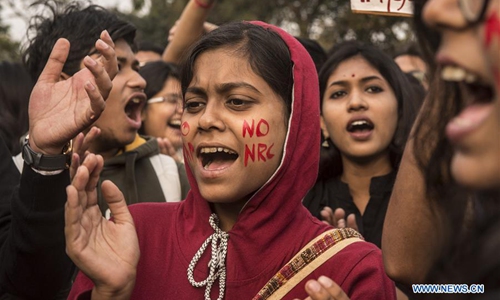HOME >> OPINION
Modi’s citizenship move one more step toward nationalism
By Zhang Jiadong Source:Global Times Published: 2019/12/23 21:15:37
Nationalism trumps liberalism in Modi’s India

Protesters participate in a mass protest against the controversial new citizenship law in Kolkata, India, Dec. 21, 2019. The death toll in violent protests against the controversial new citizenship law in India rose to 22 on Saturday, officials said. (Xinhua/Tumpa Mondal)
A controversial amendment to the citizenship act in India has caused quite a stir both within and outside the country. The Citizenship Amendment Act grants ethnic minorities, except Muslims, who came to India from Pakistan, Bangladesh and Afghanistan to escape religious persecution before December 31, 2014, the right to Indian citizenship.In India, riots erupted from Assam to the capital New Delhi, resulting in casualties and huge loss to property. Internationally, it has affected India's ties with many countries, including the US, Japan and European countries. Japanese Prime Minister Shinzo Abe had to postpone his India visit in the wake of the violence.
The US reaction was even fiercer. US Statement Department spokesperson said, "The US urges India to protect the rights of its religious minorities in keeping with India's constitution and democratic values." Sam Brownback, the US envoy on religious freedom, called on India to "abide by its constitutional commitments." The US Commission on International Religious Freedom also demanded sanctions against Indian Home Minister Amit Shah.
The outrage is a result of Muslims being excluded from getting a citizenship. India claims that Muslims are unlikely to face religious persecution in Pakistan, Afghanistan and Bangladesh, as these are Islamic countries.
However, the international community does not view the legislation as an isolated case. Taking India's scrapping of Kashmir's special status, the judgment of India's Supreme Court on the land ownership in the Babri Masjid demolition case in Ayodhya, and the repeated incidents of communal violence into consideration, we can see that the latest controversy is a manifestation of rising Hindu nationalism.
But broadly speaking, it reflects the conflict between liberalism and nationalism. In India, the world's largest democracy, Prime Minister Narendra Modi has embarked on a path of nationalism. He tries to achieve a unified national recognition via the idea of having one country, one nation, one religion and one language and eradicate diversification and fragmentation in India's society and culture.
Modi hopes that such integration can provide a stable social and political foundation for the country's development, thus eventually achieving India's ambition of becoming a major world power.
This is not democratic political thought imbibed from the West but something from Eastern mind-set. This means amid the conflict between liberalism and nationalism, liberalism loses. India trying to seek development through a Western liberal path has failed, or it could not meet the demand of Hindu nationalists.
In an era of rising nationalism and populism, Modi's move is not isolated. Repelling diversity in politics and emphasizing one's own interests has become the new normal. What Modi has done in India has similarities with moves of US President Donald Trump and British Prime Minister Boris Johnson.
More importantly, Modi's strategy of making India a homeland for Hindus will be bound to have a spillover effect. At the regional level, conflicts are likely to emerge between India and neighboring countries, especially those having a Hindu population. India cannot move all Hindus to India and the issue of protection of foreign Hindus may arise.
The rise of Hindu nationalism has broader implications for international politics. Hindu nationalism tends to be motivated by winning, which needs constant victories and reputation to nurture itself, or it will lose the driving force or even destroy development, unlike nationalism in China, which tends to be triggered by sorrowful sentiment, when the country is being invaded or bullied.
Therefore, Hindu nationalism will not be satisfied to be only the dominant force within India. It will push the country to pursue higher international status - from permanent membership in the UN Security Council to dominance in the Indian Ocean and South Asia and eventually a major world power - to satisfy the need for victory and reputation.
In fact, although many in the Western liberal world oppose Modi's move and his Bharatiya Janata Party, Indian migrants in the US, Australia and Europe support his strongman style and hard-line stance.
India boasts the potential to become a major world power and Hindu nationalism may become an issue that can influence the world.
The author is director of the Center of South Asian Studies, Fudan University. opinion@globaltimes.com.cn
Newspaper headline: Nationalism trumps liberalism in Modi’s India
Posted in: ASIAN REVIEW